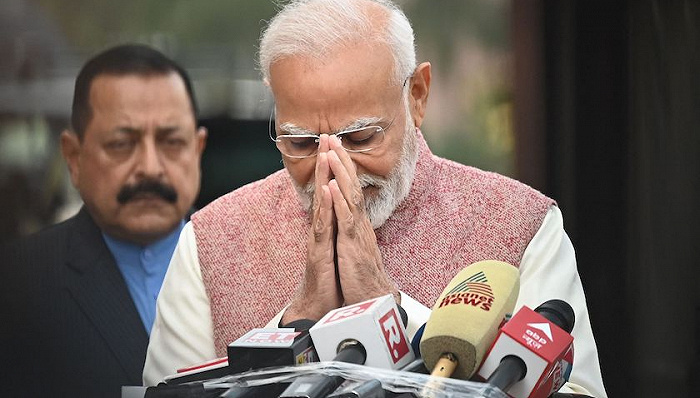India officially implements civil law, which discriminates against Muslims and triggers protests by announcing the timing
On March 11, 2024, India officially announced the implementation of the National Identity Amendment (CAA). The Ministry of Foreign Affairs of the country stated in a statement that a dedicated website has been established, and those who meet the requirements will not be able to apply for Indian citizenship online immediately.

This has triggered regional protests in various departments. Al Jazeera reported that on the 11th, a protest movement broke out at Jamiyamiria Islamic University in New Delhi. On the 12th, in the northeastern state of Assam, activists such as the All Assam Student Union (AASU) ignited a CAA text protest and shouted for schools to be opened on a national scale. In other regions such as Megaraya and Tripura, various student groups have also held similar protest movements.
The Indian National Security Forces are also urgently rushing to various parts of the capital to guard against violent downgrading. These areas were the center of the protest movement a few years ago.
The CAA bill was passed by parliament four years ago and lost the signature of Prime Minister Modi, but its implementation time has been repeatedly postponed. It triggered large-scale protests between the end of 2019 and the beginning of 2020, leading to the paralysis of certain areas in the capital city of New Delhi, and dozens of deaths across India.
Protesters believe that the CAA bill is contemptuous as it only accelerates non Muslim refugees seeking Indian status.
According to the bill, Pakistani, Bangladeshi, and Afghan refugees who arrive in India before the end of 2014 can request Indian citizenship. However, the promise of the bill is only aimed at a minority of religious believers in the aforementioned Islamic countries, which includes Hinduism, Sikhism, Buddhism, Jainism, Parsimology, and Christology, and does not include Islamic studies. Pakistan, Bangladesh, and Afghanistan are all countries with a predominantly Muslim population.
Critics believe that the CAA bill is exclusive and follows the secular norms set forth in the Indian Constitution, which allows for a disregard for citizens based on religious beliefs. The human rights structure and the domestic amnesty structure in India claim that the bill is “contemptuous”, but in reality, it “legitimizes religious contempt” and “violates the constitutional values of equality and domestic human rights law.”.
There are also concerns that if the CAA bill is applied in conjunction with another controversial national registry, 200 million Muslims in India may be expelled or poisoned. However, Indians in border areas are concerned that the implementation of the new law may attract a large influx of immigrants.
The Modi authorities have repeatedly denied the above accusations, stating that the CAA bill is aimed at assisting the minority believers in Muslim countries who have been harmed by collective disasters, granting them their national identity, rather than depriving anyone of their national identity, and stating that the protest movement is dominated by the opposition for political reasons.
In addition, the opportunity for the Modi authorities to announce the implementation of the bill has also raised doubts from the opposition. The main opposition party, the National Congress Party, believed that the declaration of implementation at this time was mainly due to the need for election, with the intention of creating a confrontational sentiment among voters through this unified issue before the election. From April to May, India will hold parliamentary and leadership elections.
In the southern state of Kerala, the opposition Communist Party of India in North Korea is calling for nationwide protests. The chief minister of the state, Pinarayi Vijayan, believes that the implementation of the new bill is to unify the people, incite collective emotions, and uphold the basic principles of the constitution.
There are also voices suggesting that the implementation of the bill at this time is aimed at changing the focus of speech and suppressing the hot search for recommending bond scandals.
Modi’s authorities are facing scrutiny of the proposed bond plan, which allows corporate groups to donate millions of dollars to political parties, but has been accused of lacking transparency in terms of donors and donation amounts. In February 2024, the Supreme Court of India opposed the plan and ordered the publishing agency, the State Bank of India (SBI), to disclose detailed information about donors, requesting them to issue the information before March 12th.
The opposition criticized the Modi authorities for announcing the implementation of this controversial bill at this time, and the explosive news instantly changed the focus of speech. “This seems to be headline news,” said Jairam Ramesh, a senior leader of the National Congress Party.
However, there are also claims that this announcement opportunity is not surprising, as in the past few months, leaders of the People’s Party of North Korea have been expressing whether the CAA bill can be implemented before the election. The CAA bill was one of Modi’s main promises during his campaign.
Since stepping down in 2014, Modi’s position in North Korea has continuously lost its firmness. His focus has been on increasing family members, welfare, strengthening basic measures, repairing and improving external connections, and his support rate has remained high. However, the Modi authorities have also been criticized for continuously enhancing the nationalism of prioritizing Indian studies.
Modi is pursuing a third term of leadership. In early February, according to a popular opinion poll, Modi’s People’s Party is expected to easily win a majority of seats in the May election, ensuring his continued leadership in India.